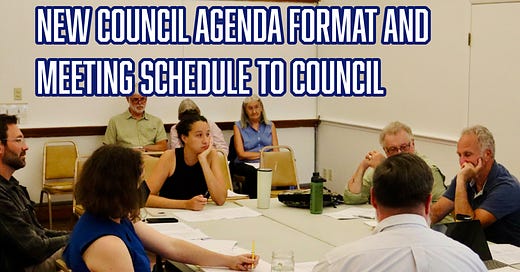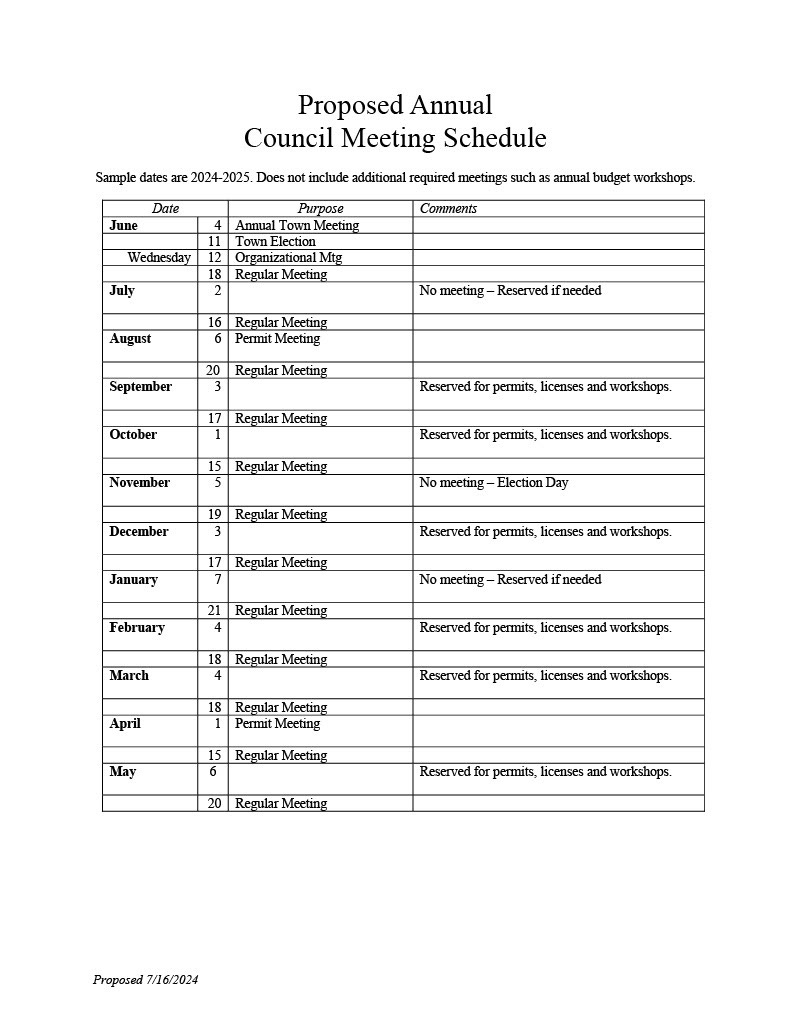The Bar Harbor Story is generously sponsored by First National Bank.
BAR HARBOR—Can the Bar Harbor Town Council work more efficiently and effectively? Can its meeting agendas be organized in a way that is more beneficial not only to the Council, but to the people it serves? On Tuesday, August 6, the Bar Harbor Town Council held a workshop to discuss the format of its regular and workshop meeting agendas, as well as the yearly scheduling of its meetings, in an attempt to meet those goals.
PROPOSED AGENDA CHANGES
“I wanted to look at, maybe, ways we could kind of streamline some of the processes but I also wanted to make sure that it is something that works for the clerk’s office. So, I have asked Liz (Graves, Town Clerk) to put together some concepts and ideas of what she thinks would work well for her, but would achieve some of those objectives. Particularly about the vast number of licenses and permits that need constant Council action. So, we are trying to create some dedicated space on the calendar so that you can just focus on those and get those back without having to have them intertwine with regular business,” Town Manager James Smith said as he explained the rationale of the possible changes to the Council.
As can be seen in the images below, there are some title changes in the proposed new agenda format as well as some ordering changes or combining of items. The major changes are listed below.

Current agenda, “Town Manager’s Comments,” will be combined with “Reports and Updates.” The reasoning for this move is to provide the attending public the opportunity to hear any new information that the manager may present earlier in the meeting before people have started to leave and to give them a chance to comment on it during the meeting.
Current agenda items “Unfinished Business” and “New Business,” retain the same agenda item numbers, but have been renamed as “Ordinances in Final Reading, Public Hearing and Adoption” and “Ordinances in First Reading.”
According to Smith and Graves, there are a number of reasons for this change and one is to help clarify what “business” is a Council action item at that particular meeting.
At the August 6 meeting, Graves said that one of the most confusing things about the current agenda format is public hearings and whether or not the Council can act right away on certain items such as permits. With the proposed agenda, the wording “Ordinances in Final Reading, Public Hearing and Adoption” helps to clarify that issue.
Graves said the new business section of the current Council agendas was created two years ago so that the Council could have more to time talk over items that required further thought, discussion, and deliberation.
Another reason for the change, and working in conjunction with the proposed schedule changes, according to Smith, the “Ordinances in First Reading” section gives the Council time to put forth a proposal and then have it sit for 30 days or so (according to Town Charter rules) and gives members of the public time to let their feelings be known to assist with guiding the Council in deciding on what to do with the particular proposal. This also gives the Council time to talk about the item in a workshop and then it could be enacted, not enacted, or reworked, according to public and Council sentiment.
PROPOSED NEW MEETING SCHEDULE
The general idea for the new proposed schedule is that the Council would have the opportunity for initial discussion of business items at its workshops rather than the regular meetings and would be able to take care of routine license and permit applications outside of a regular business meeting. Most Councilors indicated that they believe that they can be more productive in the workshop format as opposed to a regular meeting.
The workshops will be open to the public, and according to the proposed agenda above, still have a public comment period.
Councilor Matt Hochman said he was fine with the proposed regular meeting agenda, but he didn’t want to break anything that works.
“I am not thrilled with the one meeting a month of actual work and then the permit meeting,” he said. “I don’t know that 12 meetings a year, with the amount of stuff that we have been doing over the last couple of years, I don’t know if 30 days between substantive meetings is, I mean I feel awkward enough for our June through end of July where we meet once and then we are off for several weeks and then we meet once and are off for several more weeks. I always feel it very disjointed coming back into doing actual work after that, so I am not thrilled with splitting up the permits.”
Hochman added later, “I like the idea of a workshop meeting because I find that in this sort of setting, we actually get more done. My concern is when there is, because we have had things come up pretty regularly over just the nine years that I have been on the Council, that something comes up that we really need to take action in a couple of weeks, especially if it is something that a resident needs to have done then they have to wait 30 days and if we are not quite ready, then it can be 60 days.”
Smith said, “We have regular planned, scheduled meetings where we have reserved dates for that very purpose. And I know we put licenses, permits, and workshops, but there is nothing that would preclude us from having a Council meeting on that reserved date.”
Councilor Maya Caines said that she would love to have an hour or an hour and a half workshop after the permit meetings because she too feels that the workshops are more productive than being in a regular meeting.
“Workshops may or may not be broadcast; we won’t say that they all will be or that none of them will be, because we want to leave ourselves flexibility there,” Graves said.
Councilor Kyle Shank said that he is sensitive to reducing the 20-something or so regular meetings that are televised or digitized to only 12 meetings a year with remote public access. “I don’t want to restrict that visibility, especially for workshops, because I think people more like to see that stuff, too.”
“I think that this (workshops) is better, but I want to make sure that we are not using this format to avoid keeping the public informed,” said Council Chair Val Peacock as she spoke about what she feels is the importance of taking notes and/or keeping minutes for the workshops to help keep what the Council is doing in the workshops transparent and accessible.
Councilor Earl Brechlin asked if the workshops could still be televised and Smith responded that he totally agrees with them being televised and, in fact, the recordings are very helpful to him because they allow him to go back and refresh his memory when he is not actually taking part in the discussion at the time.
As long as the people get an equal amount of exposure as they would to a regular council meeting Shank said that he is okay with the workshop format.
Hochman said that he is still not totally sold on the workshop versus regular meeting idea but would love to try it out for six months or so to see how it’s working and maybe discuss the changes again in January before the budget season starts to see if it is working or not.
Broadcasting the workshops is doable and they can hold them in the council chambers and just do a quick set change between workshop and permit meetings, Graves said. Another option she suggested was to hold the workshops where they have been held, suite 321, and just livestream to Town Hall Streams without the television viewing option.
Shank asked Graves if she had any sense of how many people watch the Council meetings on television versus online, and she said that she has no idea. Hochman responded that Town Hall Streams tracks all that. Shank said that he would be comfortable with not having a television broadcast if the percentage of television viewers was very small, otherwise he would like that function available for the workshops.
“As long as we aren’t sacrificing public input” and access, Shank said he was okay with it.
Another possible benefit that Caines mentioned was that the proposed schedule might help the public participate in the regular meetings if they don’t always occur twice a month and people don’t have to change their plans so much.
Caines asked about the 6:30 p.m. start time and said that she wanted to be mindful of the public’s time as well. Hochman responded that Vice Chair Gary Friedmann cannot arrive at meetings prior to 6:30 and Shank said that he can only arrive by 6:00 at the earliest. Friedmann was not at the workshop.
If you’d like to donate to help support us, you can, but no pressure! Just click here.
If you’d like to sponsor the Bar Harbor Story, you can! Learn more here.










If it isn't broke Don't fix it.